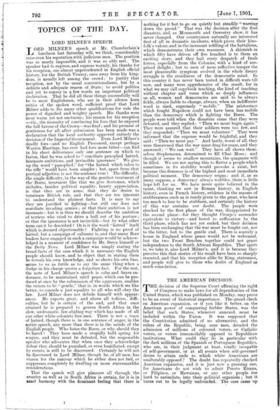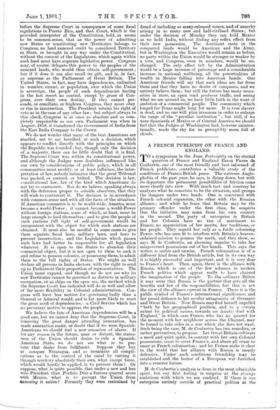THE AMERICAN DECISION. T HE decision of the Supreme Court affirming
the right of Congress to make laws for all dependencies of the United States, which was published on Monday, may prove to be an event of historical importance. The grand check on American expansion, or if you like it better, on the American power of conquering feebler States, was the belief that such States, whenever annexed, must be included within the Union. It was supposed that the Constitution admitted of no alternative, and the rulers of the Republic, being sane men, dreaded hie admission of millions of coloured voters, or Catholic voters, or voters irreconcilably opposed to ' Republican institutions. What could they do in particular with the dark millions of the Spanish or Portuguese R,epublics. who are, in their judgment at least, totally incapable of self-government, or at all events when self-governed desire to attain ends to which white Americans are unalterably opposed ? The doubt has repeatedly checked American expansion, and it is just now a pressing one, for Americans do not wish to admit Puerto Ricans, or, Filipinos, or Hawaians, or any other people too hard to assimilate, into their political organism ; but it turns out to be legally unfounded. The case came up before the Supreme Court- in consequence of some lical regulations in Puerto Rico, and that Court, which is the provided interpreter of the Constitution, held, as seems to be common-sense, that as the power of admitting new States or constituting new Territories belongs to Congress, no land annexed could be considered Territory or State, or brought in any way under the Constitution, without the consent of the Legislature, which again within such land must have supreme legislative power. Congress may, of course, delegate this power to the peoples of the annexed lands, who would thus obtain self-government ; but if it does it can also recall its gift, and is, in fact, as supreme as the Parliament of Great Britain. The United States, in fact, may have dependencies, unlimited in number, extent, or population, over which the Union is sovereign, the people of such dependencies having in the last resort no control, except by grace of Con- gress, over their own destiny. If they cannot per- suade, or conciliate, or frighten Congress, they must obey or rise in insurrection. The President retains his right of veto as in the case of any other law ; but subject always to this check, Congress is at once as absolute and as com- pletely responsible as our own Parliament was when in August, 1858, it transferred the Government of India from the East India Company to the Crown.
We do not wonder that many of the best Americans are startled, not to say horrified, at such a decision, which appears to conflict directly with the principles on which the Republic was founded ; but, though only the decision of a majority, there can be little doubt that it is final. The Supreme Court was within its constitutional power, and, although the Judges were doubtless influenced like our own by considerations of public policy, which in all communities must modify, or at least influence, the inter- pretation of law, nobody intimates that the great Tribunal was packed, or coerced, or bribed. The decision is law, constitutional law, law of the kind which Americans do not try to controvert. Nor do we believe, speaking always with the deference proper to outside observers, that they will Wish to controvert it. The decision is in accordance with common-sense and with all the facts of the situation. If American commerce is to be world-wide, America must become a world-Power ; it cannot become a world-Power without foreign stations, some of which, at least, must be large enough to feed themselves ; and to give the people of such stations full right of self-government would be inconsistent with the object for which such stations are obtained. It must also be needful in some cases to give them separate fiscal laws, military laws, and laws to prevent insurrection ; and. the Legislature which passes such laws had better be responsible for all legislation whatever. It is open to the States to abandon their commercial object, but it is not open to them to seek it and refuse to possess colonies, or possessing them, to admit them to the full rights of States. We might as well declare all persons in India electors, with the right to send up to Parliament their proportion of representatives. The Union must expand, and though we do not see why its new Territories cannot be governed as districts in military occupation, or as. ships on the open sea, the method which the Supreme Court has indicated will do as well and allow of far more flexibility in Colonial administration. Con- gress will have less motive for governing badly, than a General or Admiral would, and is far more likely to meet the great need of dependencies,—a Civil Service which has no pecuniary motive to oppress the people: We .believe the fate of American dependencies will be a good one, but we cannot deny that the Supreme Court, in removing the great danger attending annexation, has made annexation xation easier, or doubt that f we were Spanish- Americans we should feel a new sensation of alarm. If for any reason in the future, -near or distant, the states- men of the Union should desire to rule a Spanish- American State, we do not see what is to pre- vent that desire from fulfilment. Suppose they 'buy of conquer Nicaragua, and so terminate all compli- cations as to the control of the canal by cutting it through territory absolutely their own, what except force, which would hardly be applied, is to prevent them? Or suppose, what is quite possible, that under a new and less wise President than Porfirio Diaz a furious quarrel arose with Mexico, 'what is to prevent the Union from annexing it entire? Formerly they were restrained by dread of including so many coloured voters, and of anarchy arising in so many new and half-civilised States ; but under the decision of Monday they can hold Mexico as we hold India, without feeling any reflex effect from their new possession. The • dominant caste- the conquered lands would be American and th 'Arniy, but in Washington the Executive would remain as before, no party within the Union would be stronger or weaker by a vote, and Congress, even in numbers, would be un- changed. The only effect felt by the Administration would be a laxge increase of patronage and a considerable increase in national wellbeing, all the potentialities of wealth in Mexico falling into American hands. Our American friends will .say that such ideas are far. from them and that they have no desire of conquests, and we entirely believe them; but still the future has many neces- sities in store, an open road produces traffic, and seeing what we see around us, we have little faith in the want' of ambition of a commercial people. The community which longed for Texas might kng for more. It is true slavery is dead, and no one will plan invasions in order to enlarge the range of the "peculiar institution " ; but still, if we were Spaniards of Mexico or of Central America we should feel that the Judges at Washington had, however uninten- tionally, made the sky for us perceptibly more full *of clouds.







































 Previous page
Previous page